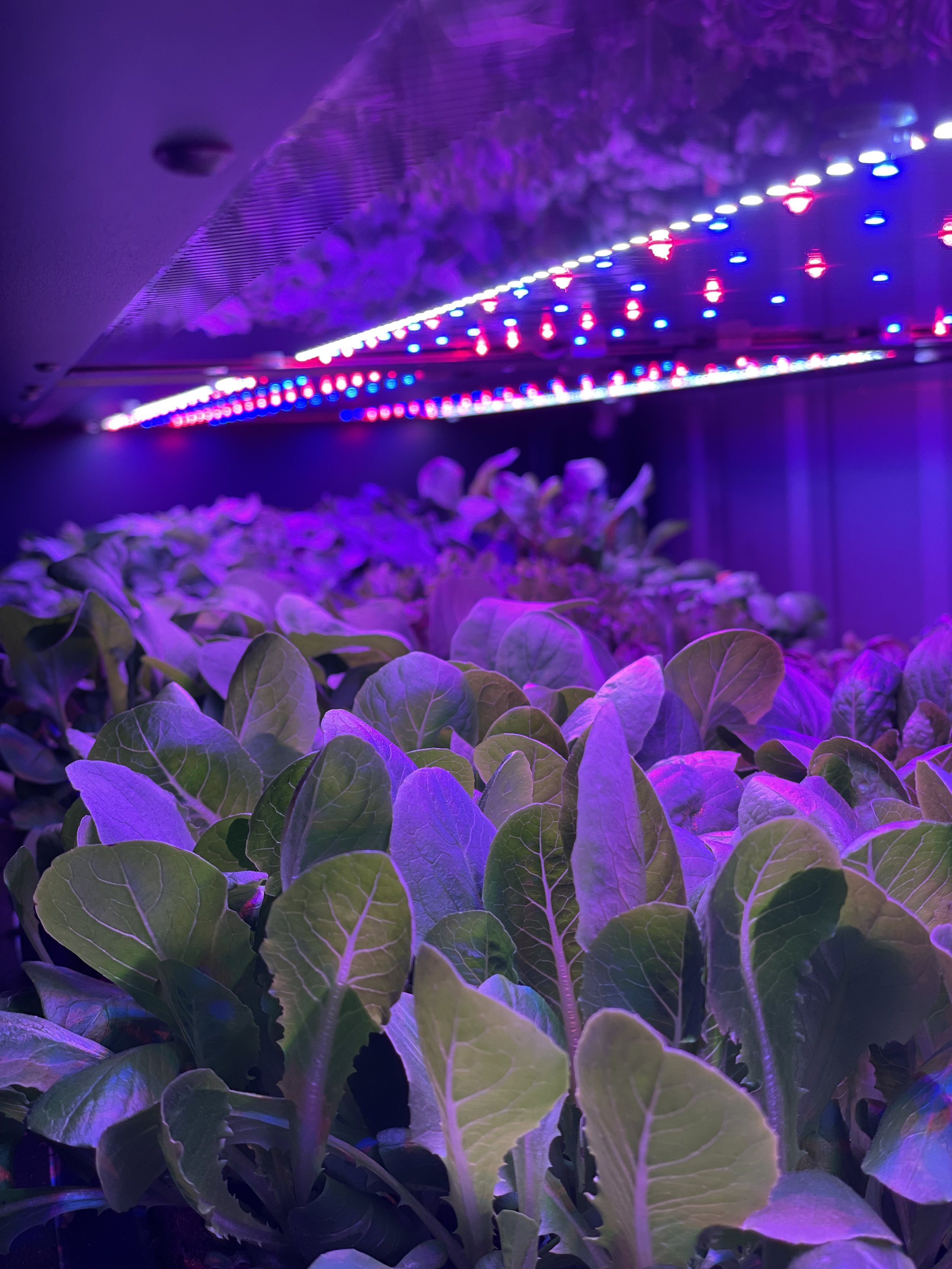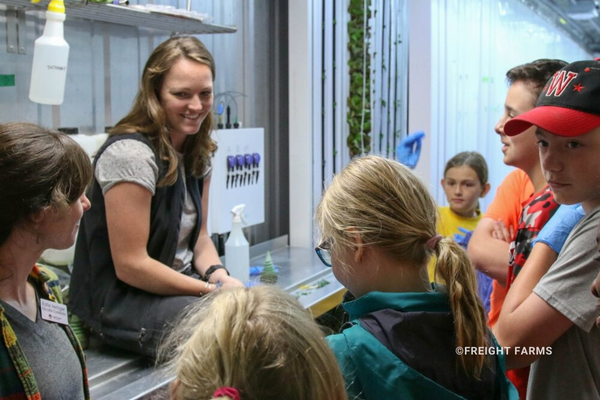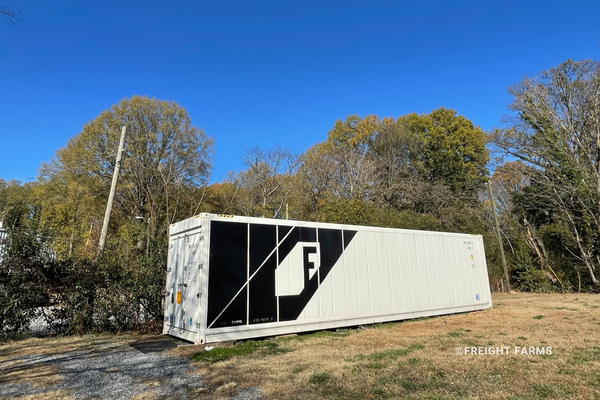
News About Farming in Shipping Containers & Limited Indoor Spaces
Crater High School Uses Freight Farm to Challenge Traditional Farming Practices
CENTRAL POINT Ore. - Crater High School utilizes a cutting-edge agricultural project that grows food in ways that challenge traditional farming practices and inspire students to think about sustainability in new ways.
The Freight Farm uses a vertical hydroponic method to cultivate crops like lettuce, basil and cilantro — all without soil.
The plants are nourished by nutrient-rich water, with no more than five gallons of water used per week.
The idea for the Freight Farm originated when agricultural science teachers Kristin Kostman and Jim Miller attended a national conference, where they discovered the concept.
“Our students are involved in every step, planting the seeds, monitoring growth, and harvesting the crops,” Kostman said. “It’s a hands-on, immersive experience that teaches them the possibilities of sustainable, urban farming.”
USA - TEXAS: FeedLot Funds Freight Farm Shipping Container Farm
Though there is still much planning and work to be done, Harper informed the council that the container will be attractive, use relatively little water and will likely be staffed part-time with volunteer opportunities available.
Among the many benefits touted by Harper and the council is the possibility for the setup to be a good educational experience for local school students. Using a shipping container and advanced hydroponic system, Community Mission Link hopes to grow about four acres worth of produce in a much smaller amount of space. This is the first use of Freight Farms by a nonprofit in the area that he knows of.
Why 2025 Is the Perfect Year to Start Your Hydroponic Farming Business
Hydroponic container farming is poised to be a transformative force in 2025, offering innovative solutions to contemporary challenges in food safety, local sourcing, supply chain resilience, health, and environmental sustainability. Here's why 2025 is an ideal time to embark on a hydroponic farming venture:
Enhanced Food Safety
Foodborne illnesses remain a significant concern, with consumers increasingly vigilant about the origins and safety of their food. Hydroponic systems, operating in controlled environments, substantially reduce the risk of contamination from pathogens like E. coli and salmonella. Additionally, the absence of soil eliminates the need for pesticides, addressing consumer concerns about chemical residues.
USA - MAINE: Farming Outside - And Inside - The Box
At the Good Table F oundation’s property in Castine, a nondescript tan shipping container sits alongside the driveway. But inside the container is one of the area’s most dynamic, high-tech hydroponic farms.
An all-volunteer organization, Good Table Foundation grows fresh greens for distribution through food pantries.
Founder Greg Nitzkowski had seen similar hydroponic container models in California. He and his wife Barbara were inspired to bring the concept to Castine, where they retired after being long-time summer residents in the area. They incorporated the organization as a 501(c)(3) nonprofit in 2023 and began operations in 2024.
The operation supplies fresh greens to Loaves and Fishes Food Pantry in Ellsworth and Caring Community Cupboard in Old Town. They operate the farm 365 days a year, and all of the produce they grow is donated. Volunteers from GTF harvest, process, and deliver the produce in a single day, delivering more than 200 4.5- ounce bags of greens each week. The mix can include kale, lettuces, arugula, and more, all packaged in compostable, labeled bags just as they might be in a traditional retail setting.
VIDEO: Growing Healthier Communities With Connecticut Foodshare
Hydroponic food is growing at the Red Deer Food Bank thanks to a $75,000 grant from The Church of Jesus Christ of Latter-day Saints.
The donation allowed the food bank to purchase a hydroponic sea can, which is now growing fresh produce for the food bank’s hamper program.
“This is a big leap forward for the Red Deer Food Bank, as we can now offer a consistent supply of fresh produce to our clients,” said Mitch Thomson, food bank executive director, in a statement.
“We receive limited amounts of fresh produce from our grocery partners. Outside of harvest time, it has been extremely difficult for us to provide enough fresh produce to our clients. The development of our hydroponic food production initiatives and greenhouse allow us to be more self sufficient in providing healthy food options for our clientele.”
The food bank purchased the hydroponic business from Mike and Lisa Slimmon of Green Euphoria.
New Mexico State University - Are Container Farms Sustainable Growing Alternatives?
Near the entrance of a 40-foot container farm installed at New Mexico State University’s Grants campus, dozens of 4-day-old kale plants lined a horizontal nursery bed, sprouting at various lengths in shades of electric green from miniature patches of densely packed soil.
Further inside, instructor Gabriel Garcia flipped a switch. Instantly, red and blue LED lights engulfed the space, illuminating the intricate vertical farming system in a shocking pink glow.
“The lights mimic the sun,” Garcia explained on a July afternoon. “This is where we’ll move the kale when their root structures develop, and they’ll stay here until they reach maturity.”
Texas Health's 'Growing Good Food' Initiative Funds 10 Local Organizations
The organizations benefiting from this year’s grants represent a tapestry of North Texas neighborhoods, each working on a different piece of the puzzle to make food more accessible, nutritious, and affordable for all. From urban farms to food pantries, the "Growing Good Food" awards are planting the seeds of lasting change.
One of the standout winners is Tabor Farms, based in Fort Worth. With a mission to address food inequities, Tabor Farms will use its funding to repair its vital wellhouse, which pumps water from 650 feet underground, ensuring that the urban farm can continue irrigating its crops.
USA - FLORIDA: Entrepreneurs Return To Their Roots For New Events Venue Venture
As managing partner of the Club at Renaissance in Fort Myers, Rodney Poole had been a customer of Rosy Tomorrows Heritage Farm in North Fort Myers. So when he saw the farm listed for sale, he knew it was a strong possibility for the new business venture he and his wife, Stacey, wanted to undertake.
Rodney and his partners sold the Club at Renaissance, a low-density gated development, in 2022. He and Stacey had been looking to purchase an event venue, but the couple hadn’t found the right fit yet. The farm checked a lot of boxes both in terms of uniqueness and functionality, since it already had a restaurant on-site.
Rodney looked at the property the day after he first saw the listing, bringing along chef Wesley Robbins (who’s also Stacey’s brother). “And I think from that day, we knew we were going to own it,” says Rodney.
"Fresh Lettuce Sales Thrive in Curaçao"
Curaçao enjoys year-round sunshine and consistently moderate temperatures, which might seem ideal for cultivating fruits and vegetables. However, appearances can be deceiving. Take tomatoes, for example a tomato plant requires cool night time temperatures at certain stages of growth, but in Curaçao, night time lows rarely fall below 24°C. As a result, much of the horticultural sector relies on systems that allow for partial temperature control.
Ferdinand Bouwman, who had managed a rehabilitation center on the island for years and was seeking a career change about five years ago, also opted for a controlled growing system. After experimenting with a small-scale, self-designed aquaponics setup and spending countless evenings researching vegetable cultivation online, he became intrigued by a highly controlled approach: Freight Farms. This vertical farming system, developed by a Boston-based technology company, involves growing crops in a container.
NMSU Researchers Look to Container Farms as Sustainable Growing Alternatives
Near the entrance of a 40-foot container farm installed at New Mexico State University’s Grants campus, dozens of 4-day-old kale plants lined a horizontal nursery bed, sprouting at various lengths in shades of electric green from miniature patches of densely packed soil.
Further inside, instructor Gabriel Garcia flipped a switch. Instantly, red and blue LED lights engulfed the space, illuminating the intricate vertical farming system in a shocking pink glow.
“The lights mimic the sun,” Garcia explained on a July afternoon. “This is where we’ll move the kale when their root structures develop, and they’ll stay here until they reach maturity.”
The container farm was one of the first projects shepherded by NMSU’s Center of Excellence in Sustainable Food and Agricultural Systems, housed in the College of Agricultural, Consumer and Environmental Sciences.
Transforming Vertical Farming With The Greenery™
Vertical farming is revolutionizing how we grow food, offering solutions to challenges like land scarcity, water shortages, and the demand for fresh, local produce. Freight Farms' Greenery exemplifies this innovation, turning a standard 320 sq. ft. shipping container into a high-tech, efficient, and scalable farming solution.
What is vertical farming?
Vertical farming is the practice of growing crops in stacked layers, often integrated with controlled-environment agriculture (CEA). Unlike traditional farming, which requires vast horizontal land, vertical farming uses innovative techniques like hydroponics to grow plants upward. This approach minimizes land use, conserves water, and allows for year-round production in urban and rural areas alike.
Farewell to Brittany Weerts: A Year of Innovation and Growth at Purdue Student Farm
The Department of Horticulture and Landscape Architecture (HLA) bids a fond farewell to Brittany Weerts, who is concluding her tenure as Hydroponic Research Operations Administrator. Throughout her time at Purdue, Weerts has played a pivotal role in advancing the department’s controlled environment agriculture capabilities.
Petrus Langenhoven, Director of the Purdue Student Farm, reflects on Weerts’ remarkable contribution: “When I learned that a Controlled Environment Ag Facility was coming to the Purdue Student Farm, I knew we had to find someone experienced, self-driven, enthusiastic, passionate, and dedicated to managing the container farms and helping educate the next generation of growers. We were very fortunate to get Brittany Weerts to take on the role.”
Growing Minds: How Container Farms Enhance Social Emotional Learning in Schools
Hydroponic container farms provide a unique environment where students can engage in activities that promote SEL:
Unstructured Conversations: Tasks like seeding and harvesting create opportunities for meaningful dialogues between students and educators, fostering relationship skills and social awareness.
Collaborative Learning: Working together in the farm setting encourages teamwork, communication, and appreciation of diverse perspectives.
Problem-Solving: Managing farm operations requires critical thinking and responsible decision-making, skills that are transferable to various life situations.
Why Freight Farms Makes Pesticides a Thing of the Past
Pesticides have been a cornerstone of traditional agriculture, used to protect crops from pests and diseases. But their impact on health and the environment is increasingly under scrutiny. From chemical residues in food to harmful runoff polluting waterways, the "bad" of pesticides is clear. Yet, with Freight Farms' hydroponic solutions like the Greenery™, there’s a better way to grow—without pesticides.
New York State - Foothills Farm Is Scaling The Production Of Hydroponic Greens For New Markets
Looking back on their first full year of production, entrepreneurs Max and Nikki Poritzky have counted one ton of produce grown and distributed to restaurants and schools from their hydroponic farming facility, Foothills Farm, in Greenfield Center.
The farm is a 40-by-eight-foot container housing an efficient, vertical growing system that produces high quality lettuces and herbs using a fraction of the space of traditional farming.
The couple have backgrounds and careers in the field of nutrition and come from health conscious families, they said.
She studied nutritional biochemistry at UC Davis and was a commercial executive marketing dietary supplements, an industry in which Max also had an executive career spanning 25 years. He said his mother founded Wild Oats, the first health food store in Saratoga Springs.
“‘Let food be thy medicine’ might sound clichéd, but this is how our families live,” Max said.
USA-MINNESOTA: Hydroponic Farm Is High Tech Operation With Small Footprint
Unlike most farmers who walk outside the door to view their crops, Tony Rahe (pronounced Ray) of Rahe of Sunshine Farms in Wykoff walks inside a door to tend to his beds of lettuce.
Instead of horizontal rows of crops planted in black soil as far as the eye can see, Rahe’s crops are planted vertically in a clean, compact space fed by constant drips of water.
Rather than being at the mercy of nature with its unpredictable weather, Rahe’s operation runs on Wi-Fi as the growing conditions are monitored by his iPad around the clock so that he has uniform light, moisture and nutrients that vary little from day to day.
'We Really Are superior': Advantages of Hydroponic Farming in Urban Areas
“The plants grow without any pesticides, herbicides, period. We don't have to do that,” said Trevor Spear, the owner of Nanue’s Farm. “When you pull the lettuce off the panel, it is fresh to eat right now. No cleaning has to happen.”
Spear took up hydroponic farming as a hobby in retirement, and soon found an unexpected passion. When he started Nanue’s Farm in 2019, downtown Raleigh was one of the first to embrace hydroponic farming.
How To Market A Freight Farm Like A Pro
Are you looking to promote your Freight Farm and expand your customer base? Whether you're already operating a Freight Farm or planning to start, effective marketing strategies can help you connect with your audience, secure sales, and maximize your farm’s success. In this guide, we’ll cover expert techniques to market your Freight Farm, increase visibility, and grow your business.



















